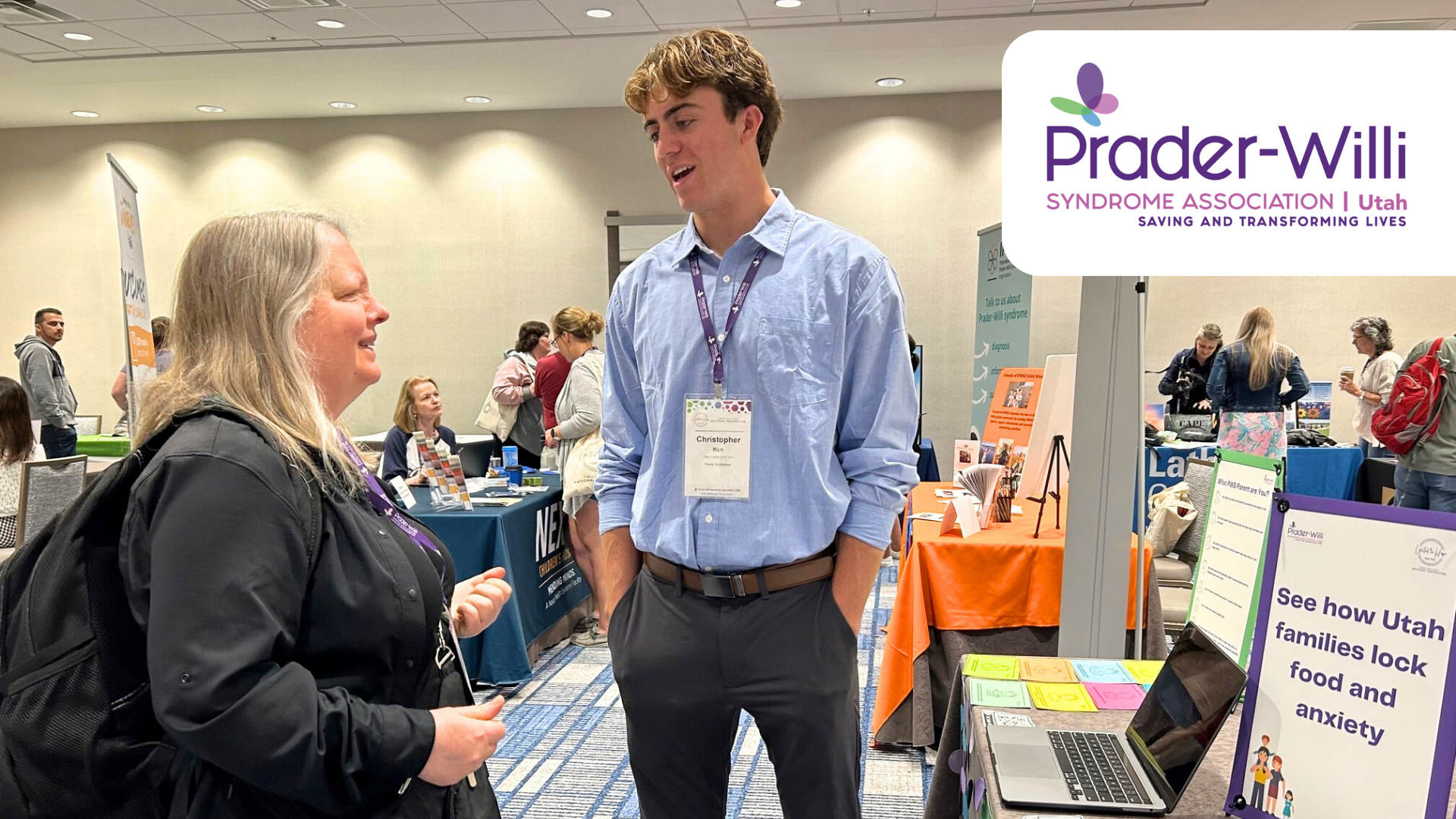Contributed by Christopher Rich, Utah PWS Association
Among the exhibitors at this year's PWSA | USA National Convention was the Utah PWS Association, which focused on food security and its role in managing PWS symptoms. The exhibition booth showcased practical strategies and innovative solutions to create a controlled environment, emphasizing the importance of food security in reducing hyperphagia and other symptoms associated with PWS.
Addressing the Need for Food Security:
The exhibit presented a comprehensive menu of items implemented by Utah families with PWS-affected individuals. These strategies served as a resourceful guide for attendees seeking practical solutions to create a safe, secure, and anxiety-free environment at home. One standout product was a self-locking fridge that offered automated control of food access, reducing human error when locking, the need for constant supervision, and time-consuming locking (https://securerefrig.com/index.html). The high level of interest and enthusiasm it generated demonstrated the pressing need for practical solutions within the PWS community to enhance food security.
Recognition and Keynote Mentions:

Contributing Valuable Information:
The 2023 PWSA | USA National Convention served as an effective platform for discussing advances in PWS care and lifestyle. The Utah PWS Association’s emphasis on food security provided attendees with tangible strategies to address core challenges associated with PWS. By engaging in meaningful discourse with families, the booth not only contributed valuable information but also opened up avenues for exploring new tools to better manage individuals with PWS.
The Utah PWS Association has provided a resourceful guide, presenting strategies, and innovative solutions to enhance food security. The recognition received an enthusiastic response from attendees demonstrating the relevance and pressing need for such interventions. By continuing to prioritize food security and engage in meaningful discussions, families and professionals can collaboratively work towards improving the quality of life for their individuals with PWS.
Share this!





 Perry A. Zirkel has written more than 1,500 publications on various aspects of school law, with an emphasis on legal issues in special education. He writes a regular column for NAESP’s Principal magazine and NASP’s Communiqué newsletter, and he did so previously for Phi Delta Kappan and Teaching Exceptional Children.
Perry A. Zirkel has written more than 1,500 publications on various aspects of school law, with an emphasis on legal issues in special education. He writes a regular column for NAESP’s Principal magazine and NASP’s Communiqué newsletter, and he did so previously for Phi Delta Kappan and Teaching Exceptional Children. Jennifer Bolander has been serving as a Special Education Specialist for PWSA (USA) since October of 2015. She is a graduate of John Carroll University and lives in Ohio with her husband Brad and daughters Kate (17), and Sophia (13) who was born with PWS.
Jennifer Bolander has been serving as a Special Education Specialist for PWSA (USA) since October of 2015. She is a graduate of John Carroll University and lives in Ohio with her husband Brad and daughters Kate (17), and Sophia (13) who was born with PWS. Dr. Amy McTighe is the PWS Program Manager and Inpatient Teacher at the Center for Prader-Willi Syndrome at the Children’s Institute of Pittsburgh. She graduated from Duquesne University receiving her Bachelor’s and Master’s degree in Education with a focus on elementary education, special education, and language arts.
Dr. Amy McTighe is the PWS Program Manager and Inpatient Teacher at the Center for Prader-Willi Syndrome at the Children’s Institute of Pittsburgh. She graduated from Duquesne University receiving her Bachelor’s and Master’s degree in Education with a focus on elementary education, special education, and language arts. Evan has worked with the Prader-Willi Syndrome Association (USA) since 2007 primarily as a Crisis Intervention and Family Support Counselor. Evans works with parents and schools to foster strong collaborative relationships and appropriate educational environments for students with PWS.
Evan has worked with the Prader-Willi Syndrome Association (USA) since 2007 primarily as a Crisis Intervention and Family Support Counselor. Evans works with parents and schools to foster strong collaborative relationships and appropriate educational environments for students with PWS. Staci Zimmerman works for Prader-Willi Syndrome Association of Colorado as an Individualized Education Program (IEP) consultant. Staci collaborates with the PWS multi-disciplinary clinic at the Children’s Hospital in Denver supporting families and school districts around the United States with their child’s Individual Educational Plan.
Staci Zimmerman works for Prader-Willi Syndrome Association of Colorado as an Individualized Education Program (IEP) consultant. Staci collaborates with the PWS multi-disciplinary clinic at the Children’s Hospital in Denver supporting families and school districts around the United States with their child’s Individual Educational Plan. Founded in 2001, SDLC is a non-profit legal services organization dedicated to protecting and advancing the legal rights of people with disabilities throughout the South. It partners with the Southern Poverty Law Center, Protection and Advocacy (P&A) programs, Legal Services Corporations (LSC) and disability organizations on major, systemic disability rights issues involving the Individuals with Disabilities Education Act (IDEA), Americans with Disabilities Act (ADA), and the federal Medicaid Act. Recently in November 2014, Jim retired.
Founded in 2001, SDLC is a non-profit legal services organization dedicated to protecting and advancing the legal rights of people with disabilities throughout the South. It partners with the Southern Poverty Law Center, Protection and Advocacy (P&A) programs, Legal Services Corporations (LSC) and disability organizations on major, systemic disability rights issues involving the Individuals with Disabilities Education Act (IDEA), Americans with Disabilities Act (ADA), and the federal Medicaid Act. Recently in November 2014, Jim retired.